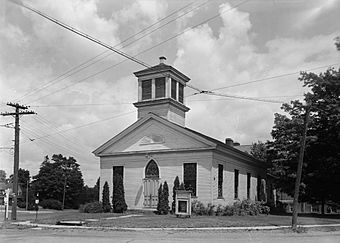First Universalist Church of Olmsted facts for kids
Quick facts for kids |
|
|
First Universalist Church of Olmsted / Olmsted Unitarian Universalist Congregation
|
|

Front and northern side
|
|
| Location | 5050 Porter Rd., North Olmsted, Ohio |
|---|---|
| Area | 1.3 acres (0.53 ha) |
| Built | 1847 |
| Architect | John Ames |
| Architectural style | Greek Revival |
| NRHP reference No. | 80002983 |
| Added to NRHP | November 25, 1980 |
The First Universalist Church of Olmsted is a very old and important church building in North Olmsted, Ohio, a city in Ohio, United States. It belongs to the Unitarian Universalist faith. This church is the second-oldest church building in Cuyahoga County, Ohio. It has been a special landmark in the community since the mid-1800s. In the late 1900s, it was officially recognized as a historic site.
Contents
Building the Church
The Universalists in North Olmsted built their church in 1847. They used a style called Greek Revival. A person named John Ames was in charge of the design. The building is a simple rectangle made of wood. Its walls are covered with weatherboarding.
Church Design Details
The walls go up to a pointed roof section called a gable. A bell tower sits on top of the roofline at the front. There are four rectangular windows on the sides of the church. Two more windows are on either side of the main entrance at the front. Above the entrance, there is a short, curved window. The entire gable section is built like a pediment. This pediment is the most decorated part of the church. It has a detailed fanlight, which is a window shaped like a fan.
The Church Bell
The bell inside the church today is very old. It was put in place in 1851. That means the bell is now more than 170 years old! Overall, the church is a simple example of the Greek Revival style. Some Victorian details were added later on. The church building has also been moved from where it was first built.
A Place in History
The people who belonged to this church have always been known for their open-minded religious views. For example, in 1878, they chose their first female preacher, Abbie Danforth. This was quite unusual for the time.
Oldest Church in the County
The church building itself is very old and has not changed much. St. John's Episcopal Church, built in 1838, is the only other church building in Cuyahoga County, Ohio that is older than the North Olmsted Universalist Church. This lack of change was important for the church to become a historic site.
National Register of Historic Places
In November 1980, the church was added to the National Register of Historic Places. This is a special list of places that are important to American history. The church qualified because of its important architecture. It also qualified because of its role in local history. Usually, churches or buildings that have been moved are not put on this list. However, this church was special enough to be included.
Other Historic Sites Nearby
The First Universalist Church is one of nine historic sites in and around North Olmsted and Olmsted Falls, Ohio. Other nearby historic places include the John and Maria Adams House, Fort Hill, the Grand Pacific Hotel, the Samuel Lay House, the North Olmsted Town Hall, the Julia Carter Northrop House, the Olmsted Falls Depot, and the Olmsted Falls Historic District.
External links
- Official website: http://olmsteduu.org/



